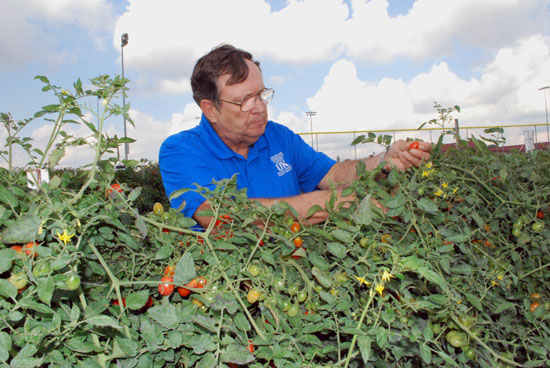Extension agents helping bring the farm to school
Extension agents helping bring the farm to school

Across the state, University of Kentucky Cooperative Extension Service personnel are showing students, parents and teachers that locally grown foods are accessible, affordable, nutritious and tasty.
Glen Roberts is the Wayne County agriculture and natural resources extension agent and a commercial vegetable grower. He approached the Wayne County School Board and the high school FFA adviser in 2011 about allowing agriculture students to raise a garden.
The first year, the garden was a half-acre and provided food for the Wayne County Schools' summer feeding program and the fall semester. This year, they expanded the garden to one acre and planted it slightly later, so the students could harvest the crops when they returned to school in the fall. It included cantaloupes, cucumbers, cabbage, broccoli, peppers, pumpkins, tomatoes and cauliflower.
“It’s kind of out of season for most people’s gardening thought process,” he said. “This is showing them that it can be done this time of the year instead of just two and three months in the summer.”
In some cases, the garden’s bounty has been more than the high school cafeteria could handle, and the school has shared the extra produce with the elementary and middle schools.
“I can’t tell you how important this program is and what a valuable resource the school garden has been to our school food service,” said Karen Gibson, Wayne County Schools district food service director. “You can’t get this taste from a purchased item, because many times the produce you purchased from a vendor travels thousands of miles before you ever get it.”
She added that food safety is another important aspect of the school garden.
"Our school garden is a safety net for us, because we know how our food is grown,” Gibson said. “I can be assured that our produce is being grown with high safety standards.”
Wayne County’s program is just one of many Farm to School efforts of the UK Cooperative Extension Service.
Jackie Walters and Janet Mullins, UK extension specialists for food and nutrition, serve as members of a statewide Farm to School Task Force. The task force developed a curriculum and resource guide that became available earlier this year. Other agencies involved in the task force include the Kentucky Department of Public Health, Kentucky Department of Agriculture, Kentucky Department of Education, Kentucky Action for Healthy Kids, Foundation for a Healthy Kentucky, UK College of Public Health, Community Farm Alliance, Tweens Coalition and school food service directors.
“We want to help increase fruit and vegetable intake among kids and help them understand that sustainable, local agriculture is good for the community,” Walters said. “Everyone benefits when you buy locally.”
Additionally, Walters helped personnel in the Kentucky Department of Public Health disseminate funding they received from the American Recovery and Reinvestment Act for Farm to School programs across the state. Programs in 13 counties received funding during a two-year period.
Calloway County was one of the Farm to School grant recipients, but efforts to incorporate local foods into the school system were in place before the grant. In 2009, La Dawn Hale, the county’s family and consumer sciences extension agent, PTA parents and teachers installed a garden at East Elementary School in Murray. An after-school environmental club then began gardening.
“I wanted to help students learn how to be self-sufficient and know where their food comes from,” Hale said.
Hale was a partner on the grant along with a representative from the Calloway County Health Department and the Calloway County School District. East Elementary was chosen as the pilot school, because the garden and environmental educational programing were already in place.
As part of the grant, Hale taught fourth- and fifth-graders the Junior Master Gardener curriculum with the help of Ashley Milby and Cathy Smith, program assistants for the Supplemental Nutrition Assistance Program-Education and the Expanded Food and Nutrition Education Program, respectively. In addition, they provided samples of tomatoes from the school garden and locally grown sweet potatoes obtained by the school system’s food service director to all East Elementary students. Students in the school’s after-school environmental club tended the garden while school was in session, and Cub Scouts watered and weeded it during the summer. As part of the grant, the fourth- and fifth-grade students went on three field trips-- to a local dairy and poultry farm, the county transfer station and the water treatment plant.
Due to the success of the program, the PTA and administrators at North Elementary School in Murray approached Milby to do a similar program at that school. That program began this year, and Hale and Milby installed two gardens with the help of PTA members. Milby is teaching the Junior Master Gardener curriculum in seven fourth-grade classrooms and three after-school environmental clubs at both schools.
4 H Youth Community Development Crops Economics Extension Family Consumer Sciences Horticulture Nutrition Sustainability


